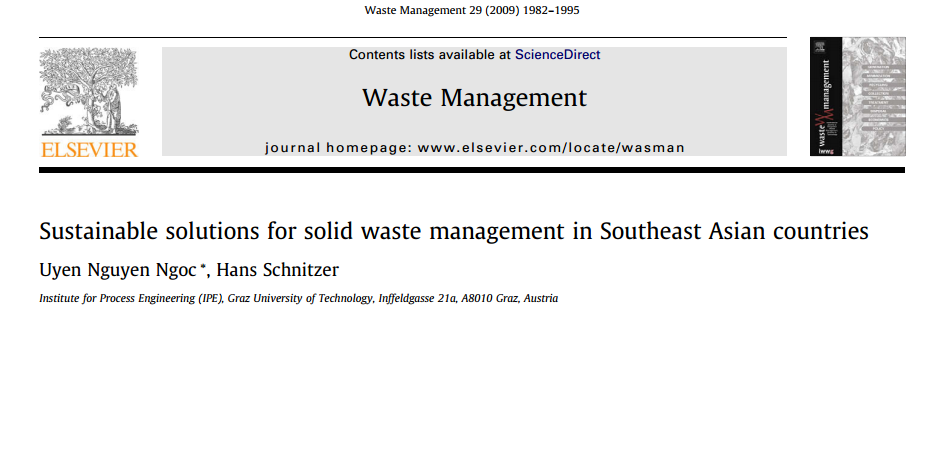REPORTS & PUBLICATION
REPORTS

Sustainable solutions for solid waste management in Southeast Asian countries
2009 | Elsevier
Human activities generate waste and the amounts tend to increase as the demand for quality of life increases. Today rate in the Southeast Asian Nations (ASEANs) is alarming, posing a challenge to governments regarding environmental pollution in the recent years. The expectation is that eventually waste treatment and waste prevention approaches will develop towards sustainable waste management solutions. This expectation is for instance reflected in the term zero emission systems.

SOLID WASTE MANAGEMENT AND 3R IN VIETNAM
2009 | Vietnam Environment Administration
CICP Working Paper, NO. 27 , Solid Waste Management in Cambodia
2009 | Cambodian Institute for Cooperation and Peace
Solid waste management consists of two sectors: the formal operation and the informal scavenging activities. Because scavenging contributes to solid waste management economically and environmentally and also serves as an occupation for some of the most impoverished in the city, recently it has become the focus of scholarly deliberation. A notion of integrating this informal sector of SWM into the formal one is proposed by different scholars. Though they appear to differ in terms of approaches and arguments, their proposed policies are place-based. This paper examines the situations of solid waste management, both the formal and the informal, in Phnom Penh city, and discusses the feasibility of integrating the informal scavenging into the formal management of solid waste. It raises questions about the possible unintended consequences when informal scavenging is integrated through such place-based approach.
Sustainable solutions for solid waste management in Southeast Asian countries
2009 | Elsevier
Human activities generate waste and the amounts tend to increase as the demand for quality of life increases. Today's rate in the Southeast Asian Nations (ASEANs) is alarming, posing a challenge to governments regarding environmental pollution in the recent years. The expectation is that eventually waste treatment and waste prevention approaches will develop towards sustainable waste management solutions. This expectation is for instance reflected in the term 'zero emission systems'. The concept of zero emissions can be applied successfully with today's technical possibilities in the agro-based processing industry.
Solid waste management in Nepal
2008 | WaterAid
This paper reflects the existing management systems practiced in various areas of Nepal in managing solid waste and contains initiatives of municipalities; national and local NGOs/CBOs; public and private entities. This paper helps to transfer the lessons and existing practices regarding soild waste managment and encourages urban, peri urban and emerging towns for similar initiatives in urban sanitation.

Waste Quantification and Characterization, Phnom Penh (2008)
2008 | UNEP
Phnom Penh Municipality (PPM) is the capital city of the Royal Kingdom of Cambodia with a total land area of 376.95 Km2. It is equal to 0.20\% of the total land area of the country. Administratively, PPM is divided into 7 districts (up to 2008) but now one more district has been determined, 76 communes, 689 villages and 4,320 groups. The population of the city is approximately 1,080,519 consisting of 188,769 households out of which 43\% live in urban area and 57\% in rural area. Population growth in the city is 3.92\%.
 The kNOwWaste Knowledge Platform was developed through a Project Cooperation Agreement funding by UNEP on 2016. The platform provides data and information on holistic waste management to stakeholders in Asia and the Pacific region. The platform was developed with the following aims: generate and consolidate data or information on holistic waste management, transform data into easily comprehensible outputs for use by key stakeholders, map out and disseminate information on international waste management projects under the GPWM and UNEP projects as well as other international partners, and provide capacity building support through dissemination of data or information support for relevant stakeholders on holistic waste and waste management system.
The kNOwWaste Knowledge Platform was developed through a Project Cooperation Agreement funding by UNEP on 2016. The platform provides data and information on holistic waste management to stakeholders in Asia and the Pacific region. The platform was developed with the following aims: generate and consolidate data or information on holistic waste management, transform data into easily comprehensible outputs for use by key stakeholders, map out and disseminate information on international waste management projects under the GPWM and UNEP projects as well as other international partners, and provide capacity building support through dissemination of data or information support for relevant stakeholders on holistic waste and waste management system.
 2025 © Regional Resource Center for Asia and the Pacific (RRC.AP). All Rights Reserved.
2025 © Regional Resource Center for Asia and the Pacific (RRC.AP). All Rights Reserved.
